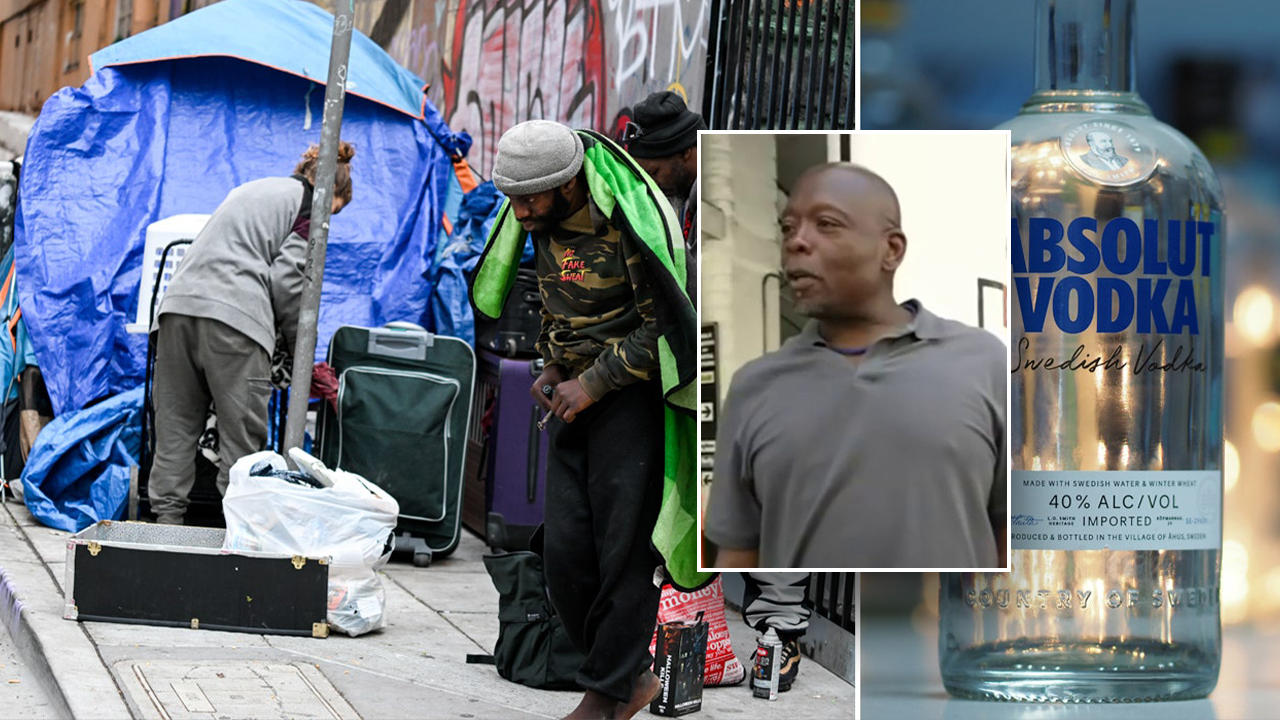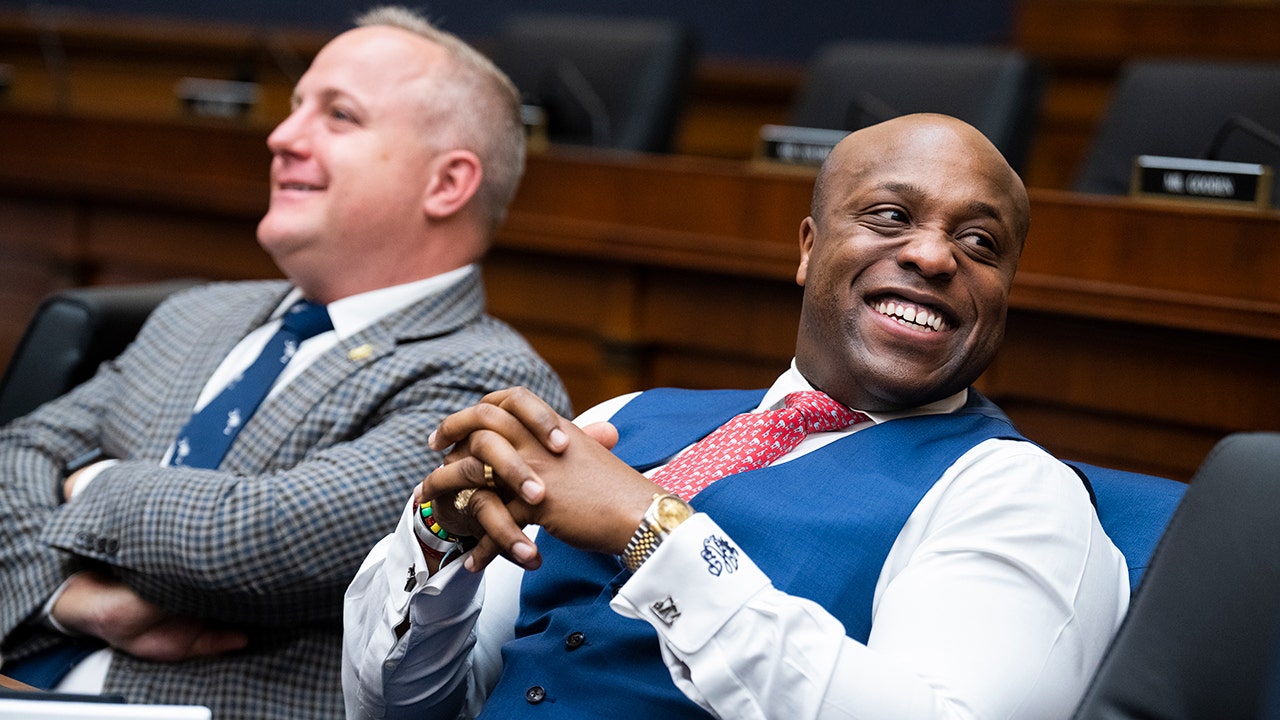World
Iran regime close to getting nuclear bomb, but what’s the holdup?
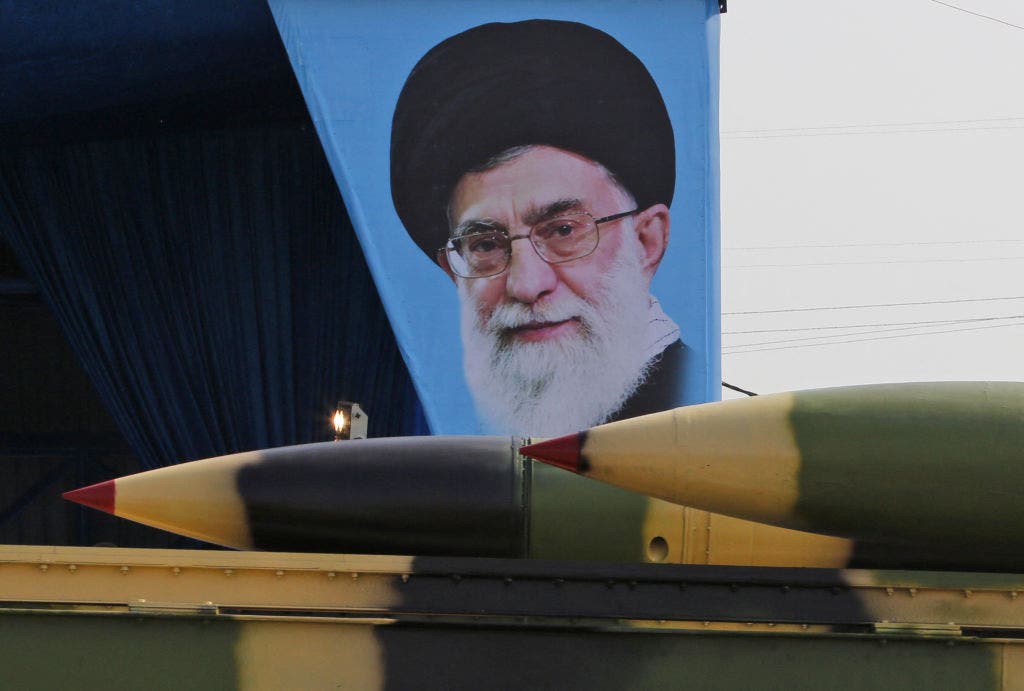
JERUSALEM — Iran has moved dangerously close to enriching weapons-grade uranium for a nuclear bomb, but the regime has not yet crossed the critical threshold of declaring it has built an atomic weapon.
Fox News Digital reached out to experts on Iran’s more than two-decade effort to join the small group of countries that have atomic weapons for explanations about what is stopping Tehran from crossing the nuclear threshold.
“If there is reason to believe that there are a number of retardants that have put a pause in their weapons development, they’d relate back to targeted attacks by the U.S. and Israel, who clearly are very much concerned about stopping the mullahs,” stated Lisa Daftari, an Iran expert and editor-in-chief of the Foreign Desk.
Daftari added, “Israel has reportedly conducted at least two dozen targeted operations on Iran’s regime in the last 15 or so years, including drone attacks, cyberattacks, if you recall Stuxnet and assassinations of key players in Iran’s nuclear program.”
IRAN UNVEILS LATEST VERSION OF BALLISTIC MISSILE AMID WIDER TENSIONS OVER NUCLEAR PROGRAM
The flag of Iran waves in front of the International Center building at the headquarters of the International Atomic Energy Agency in Vienna, Austria, May 24, 2021. (AP Photo/Florian Schroetter, FILE)
“We cannot underestimate the power of international pressure on Iran’s regime,” Daftari told Fox News Digital.
“That pressure has been assuaged under this current administration, who, while stepping away from the nuclear deal, are still hoping to revive some form of normalization agreement with Tehran. Otherwise, when there is consistent and targeted pressure on Iran’s regime in the form of enforced sanctions and economic and political isolation, we see a weakened regime and an emboldened Iranian people who are brave enough to take to the streets,” she said.
Kamal Kharrazi, a senior adviser to the Supreme Leader of Iran’s regime, Ayatollah Ali Khamenei, boasted last year that “Iran is on the nuclear threshold, and this is not something secret,” according to a 2022 report in the state-controlled Tehran Times.
Just this year, the International Atomic Energy Agency revealed Iran’s regime enriched 84% purity of uranium, 6% shy of the 90% enriched uranium required for a nuclear weapon.
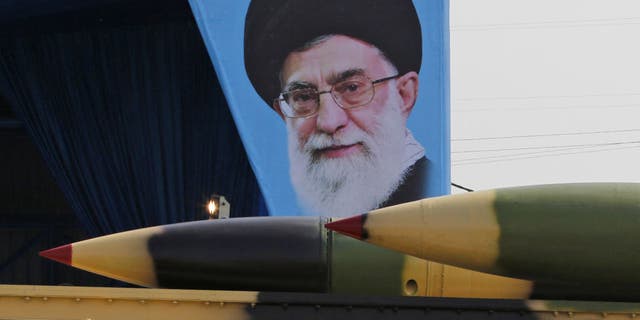
An Iranian military truck carries surface-to-air missiles past a portrait of Iran’s Supreme Leader Ayatollah Ali Khamenei during a parade on the country’s annual army day April 18, 2018, in Tehran. (Atta Kenare/AFP via Getty Images)
Iran’s regime is testing the resolve of the United States and other world powers who have repeatedly stated they will not permit Iran to build a nuclear weapon. Israel views Tehran’s atomic weapon program as an existential threat because Tehran has frequently declared it seeks to obliterate it.
“It’s an open question as to whether Khamenei wants to die as the father of the Shiite atomic bomb or as the one who kept the Islamic Republic on the nuclear path without provoking a war or pulling the trigger,” Behnam Ben Taleblu, senior fellow and Iran expert at the Foundation for Defense of Democracies, told Fox News Digital.
“Currently, however, Khamenei’s perception of diplomatic and security policy success abroad and ascendency at all costs at home may be sufficient to push him over the edge as he continues to age,” added Taleblu, who recently authored a comprehensive assessment of Iran’s ballistic missile capabilities and intentions.
Fox News Digital reported this week that Iran is burrowing deep into tunnels near a peak of the Zagros Mountains in central Iran to shield a nuclear facility from conventional weapon attacks.
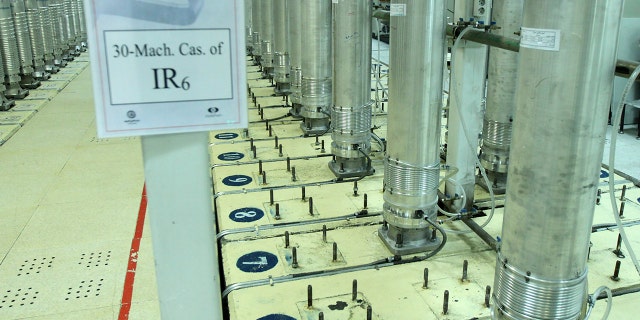
This file photo released Nov. 5, 2019, by the Atomic Energy Organization of Iran, shows centrifuge machines in the Natanz uranium enrichment facility in central Iran. (Atomic Energy Organization of Iran via AP, File)
Aside from the technological impediments for the construction of a modern nuclear weapon, Iran’s regime has been confronted with deterrence from Israel and the United States over the years, including Stuxnet computer worm sabotage of the regime’s nuclear fuel production system.
“I think Iran’s leadership to date has calculated the costs of doing so would outweigh the benefits at this juncture — mainly a destructive attack which targets its entire nuclear infrastructure,” Jason Brodsky, policy director of the U.S.-based United Against a Nuclear Iran (UANI), told Fox News Digital.
ISRAEL’S DEFENSE CHIEF WARNS TEHRAN AGAINST FURTHER NUCLEAR DEVELOPMENT: ‘WE HAVE THE ABILITY TO HIT IRAN’
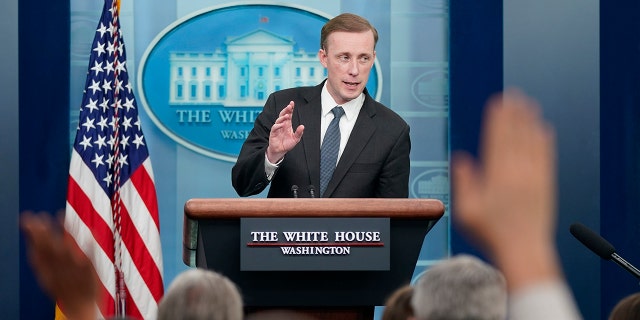
National security adviser Jake Sullivan speaks during a press briefing at the White House March 22, 2022. (AP Photo/Patrick Semansky)
“But my concern is that calculus risks changing as the U.S. and Europe’s non-response to Iran’s nuclear escalation over the last two years — for example 60% enrichment and production of uranium metal — has emboldened Tehran’s leadership to continue testing international red lines.”
Brodsky added that “If that perception is not altered, Iran is likely to enrich uranium to weapons-grade levels at 90%. Tehran’s risk-aversion to date shows that it can be deterred. But that can quickly change if the Islamic Republic receives no pushback as it advances its nuclear program.”
Earlier this month U.S. National Security Adviser Jake Sullivan said in a speech to the Washington Institute for Near East Policy that the Biden administration had “Made it clear to Iran that it can never be permitted to obtain a nuclear weapon. As President Biden has repeatedly reaffirmed, he will take the actions that are necessary to stand by this statement, including recognizing Israel’s freedom of actions.”
“We’ve restored unity of purpose between the United States and Europe and much of the world against Iranian provocations, nuclear activities,” he said while also noting that the U.S. is exerting pressure on “Iran through sanctions.”
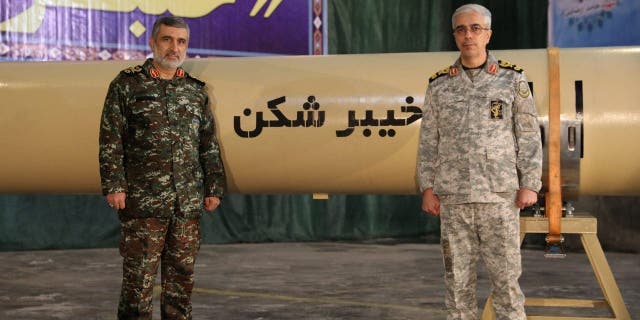
Iranian Armed Forces Chief of Staff Major General Mohammad Bagheri and IRGC Aerospace Force Commander Amir Ali Hajizadeh stand together during the unveiling of a Kheibar Sheka missile at an undisclosed location in Iran Feb. 9, 2022. (West Asia News Agency/Handout via REUTERS )
“Iran has not crossed the threshold into building a nuclear weapon because the supreme leader has not decided to weaponize the program,” Joel Rubin, a former deputy assistant secretary of state who served in the Obama administration, told Fox News Digital.
“This position has been confirmed by multiple U.S. intelligence community assessments over the past several years.” He continued that “While only the supreme leader can truly say why he has taken this position, it’s known that continued diplomatic isolation by the international community that followed the expansion of its nuclear program is causing pain for the Iranian regime.”
AIR FORCE SQUADRON IN MIDDLE EAST ARMS UP WITH ‘BUNKER BUSTING’ BOMBS TO COUNTER IRAN
Rubin said it was clear that Tehran was “Still open to pursuing a diplomatic path as it knows that if it crosses into weapons-grade nuclear arsenals, which it is capable of doing, the nation would be further isolated internationally — even by its allies. It would trigger a regional nuclear arms race, and Tehran would never get out from under the sanctions pressure it currently is experiencing,” he said.
“What is clear from recent years is that a firm, verifiable diplomatic agreement with Iran over its nuclear program is the best way to ensure that it never obtains a nuclear weapon. Military threats alone will not get us there,” Rubin concluded.
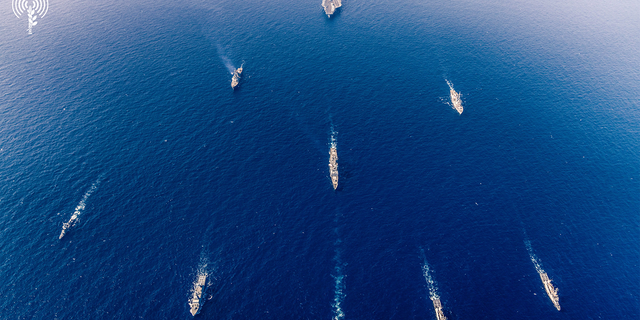
U.S. Central Command and the IDF are taking part in a joint military exercise known as “Exercise Juniper Oak” taking place in Israel and the Eastern Mediterranean Sea. (IDF Spokesman’s Unit)
Low-intensity military deterrence against Iran’s regime has been playing out for a number of years, according to Israeli media outlets.
“We have the ability to hit Iran,” Israel’s defense chief warned this week.
The United States military and Israel Defense Forces launched a joint drill, Juniper Falcon, in February. The IDF’s website stated “The exercise tested collective U.S.-Israel readiness and strengthened the interoperability between the two militaries,” the IDF stated on its website after the drill.
Yet there are growing concerns the Biden administration is not inflicting enough pressure on Iran’s regime to change its conduct. Over 100 former world leaders urged Biden this week to get tough on Iran.
Earlier this week Israel’s Defense Minister Yoav Gallant reportedly said during a visit to Hatzor Air Force Base that Israel is preparing for a “complex, difficult and more significant objective.”
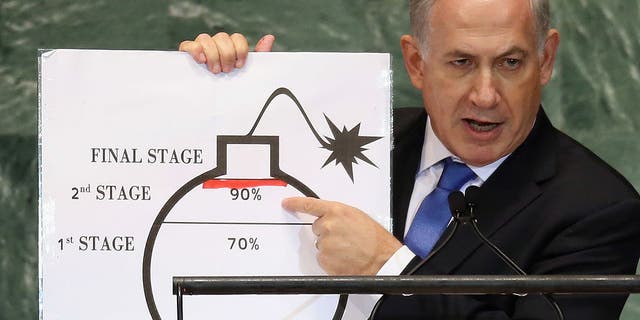
Benjamin Netanyahu, prime minister of Israel, points to a red line he drew on a graphic of a bomb while addressing the United Nations General Assembly Sept. 27, 2012, in New York City. (Mario Tama/Getty Images)
EX-MOSSAD CHIEF SIGNALS ISRAEL BEHIND IRAN NUCLEAR ATTACKS
Military deterrence has been the single greatest factor in slowing Iran’s illicit nuclear program. U.S. saber-rattling has influenced a change in the Islamic Republic’s behavior.
In 2007, a declassified U.S. National Intelligence Estimate determined with “high confidence” that Iran’s regime stopped it nuclear weapons program in 2003. Iran experts believe the Islamic Republic temporarily pulled the plug on its illegal atomic program due to the U.S. invasion of Iraq and fears the U.S. would launch a military incursion into Iran.
The sheer survival of Iran’s regime forced the then supreme leader Khomeini to agree to a cease-fire with Iraq in 1988 after eight years of war. At the time he compared the truce to drinking from “a chalice of poison.”
American pressure prompted Khomeini to release U.S. hostages in 1981 during the diplomatic crisis. All of these examples suggest Iran’s regime is enormously vulnerable to military pressure and other forms of leverage that threaten its legitimacy and existence.
“Iran’s regime is quite calculating,” Daftari said. “As rogue as they have been in capturing oil tankers in the seas, continuing the support of regional terror and, of course, the brutal wholesale executions of innocent protesters, they continue to weigh out the consequences of a heated military confrontation with Israel or the United States.”

World
Israeli tanks push deeper into Rafah; battles rage in northern Gaza

World
Former Gambian interior minister sentenced for crimes against humanity by Swiss court
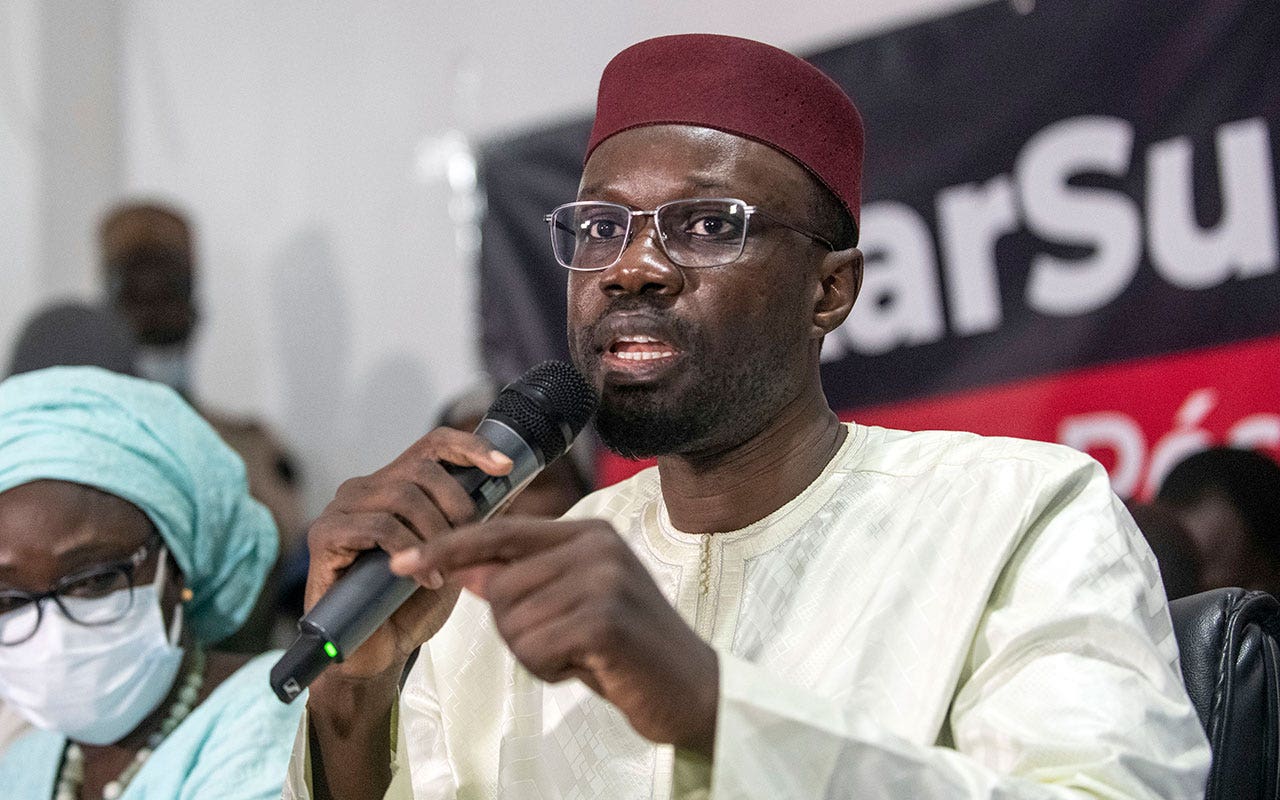
- Switzerland’s top criminal court convicted former Gambian Interior Minister Ousman Sonko of crimes against humanity.
- Sonko has been sentenced to 20 years in prison for his role in repression under ex-dictator Yahya Jammeh.
- Sonko, who served from 2006 to 2016, faced charges including homicide, torture and false imprisonment.
Switzerland’s top criminal court on Wednesday convicted a former interior minister of Gambia for crimes against humanity and sentenced him to 20 years over his role in repression committed by the west African country’s security forces under its longtime dictator, a legal advocacy group said.
Prosecutors had been seeking a life sentence for Ousman Sonko, Gambia’s interior minister from 2006 to 2016 under then-President Yahya Jammeh, TRIAL International said.
The Federal Criminal Court in the southern town of Bellinzona ruled that Sonko’s crimes — including homicide, torture and false imprisonment — amounted to crimes against humanity. However, they did not rise to “aggravated” cases that could have brought the maximum penalty of life behind bars, according to several lawyers who attended the trial.
SENEGAL’S OPPOSITION LEADER OUSMANE SONKO TO ADDRESS SUPPORTERS AFTER MONTHS IN PRISON
The trial, which began in January, was hailed by advocacy groups as a watershed application of the principle of “universal jurisdiction,” which allows for the prosecution of serious crimes committed abroad.
Legal advocacy group TRIAL International said on Wednesday that Ousman Sonko, pictured above, has been sentenced to 20 years in prison. (AP Photo/Sylvain Cherkaoui, File)
Activists and legal experts say the verdict could send a message to Jammeh, who fled Gambia and remains in exile in Equatorial Guinea.
Sonko, who was in the courtroom for Wednesday’s reading of the verdict, offered little reaction when a translation was read out in English, said TRIAL International’s legal adviser Benoit Meystre, who also attended the proceedings.
Sonko applied for asylum in Switzerland in November 2016 and was arrested two months later. The Swiss attorney general’s office said his indictment, filed a year ago, covered alleged crimes during 16 years under Jammeh, whose rule was marked by arbitrary detention, sexual abuse and extrajudicial killings.
TOP SENEGALESE OPPOSITION LEADER FREED FROM JAIL AS ELECTION NEARS
Sonko was accused of supporting, participating in and failing to stop attacks against opponents in Gambia, an English-speaking West African country surrounded by neighboring Senegal. The crimes included killings, torture, rape and numerous unlawful detentions, prosecutors said.
“This unprecedented conviction based on universal jurisdiction in Europe is the confirmation that no one is above the reach of justice,” Meystre said in a text message. “Even the most powerful figures can be brought to account for their participation in mass atrocities.”
Madi MK Ceesay, an award-winning journalist who was once arrested under Sonko’s orders and who testified in the trial, told The Associated Press the proceedings showed that “no matter what, the long arm of justice can always catch the perpetrator.”
Reed Brody, an American human rights lawyer who attended the trial, said Sonko’s conviction was a pivotal step toward justice for Jammeh’s victims.
“The long arm of the law is catching up with Yahya Jammeh’s accomplices all around the world, and hopefully will soon catch up with Jammeh himself,” he said.
Sonko was convicted of homicide, torture and false imprisonment as crimes against humanity, while rape charges against him were dropped, Brody wrote on X.
Outside the courtroom, Olimatou Sonko, the defendant’s daughter, told Swiss public broadcaster SRF “it isn’t fair” that the full proceedings of the trial weren’t translated to English from German, which her father doesn’t understand.
Philip Grant, executive director at TRIAL International, which filed the Swiss case against Ousman Sonko before his arrest, said he was the highest-level former official ever to be put on trial in Europe under the principle of universal jurisdiction.
Sonko, who joined the Gambian military in 1988, was appointed commander of the State Guard in 2003, a position in which he was responsible for Jammeh’s security, Swiss prosecutors said. He was made inspector general of the Gambian police in 2005.
He was removed as interior minister in September 2016, a few months before the end of Jammeh’s government, and left Gambia to seek asylum in Europe.
Ousman Sonko is not to be confused with leading politician Ousmane Sonko in Senegal, who spells his first name slightly differently.
Jammeh seized control in a 1994 coup. He lost Gambia’s 2016 presidential election but refused to concede defeat to Adama Barrow, and ultimately fled amid threats of a regional military intervention to force him from power.
“The verdict against Ousman Sonko is a milestone in the fight against impunity and a historic success for universal jurisdiction in Switzerland and Europe,” Amnesty Switzerland wrote on X. “Even former ministers can be prosecuted! Victims and their families finally see justice.”
World
EBU woes deepen as political parties excluded from EU election debate
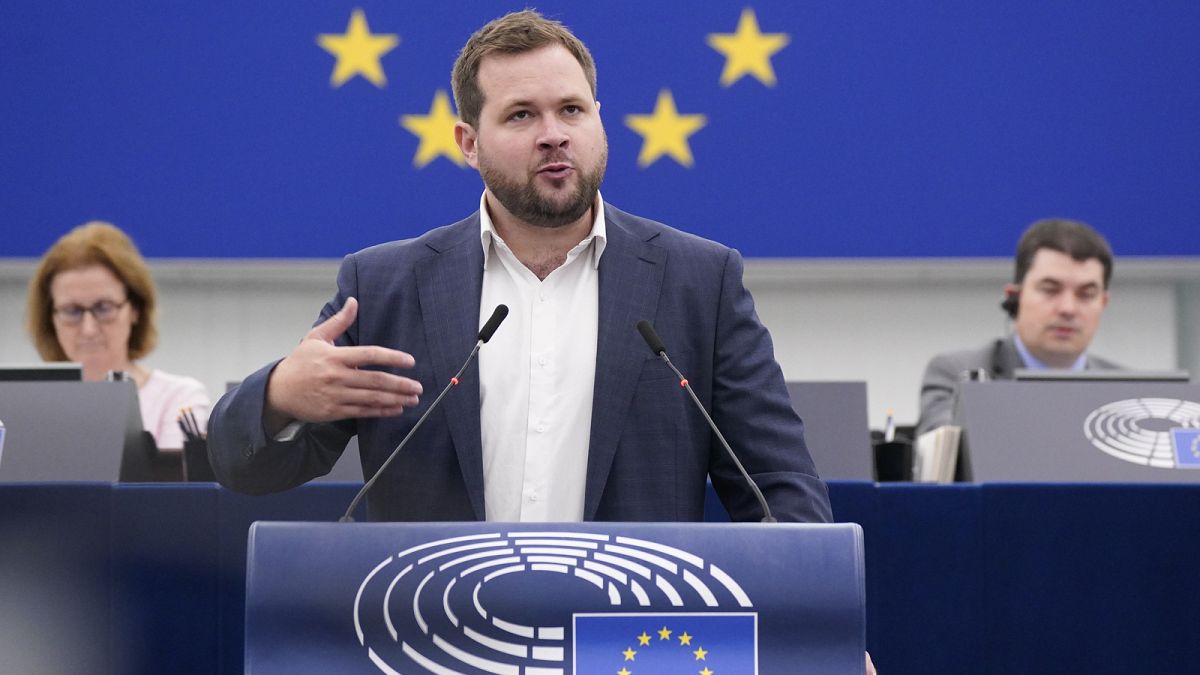
The broadcaster says only parliamentary groups fielding a lead candidate in June’s election can be represented at the televised stand-off.
The European Broadcasting Union (EBU) is under further scrutiny after it was accused by two political parties of excluding them from its Eurovision election debate.
The far-right Identity and Democracy (ID) party and the regionalist, separatist European Free Alliance (EFA) both say they have been intentionally shunned by the organisers of the debate, set to take place at the European Parliament in Brussels on May 23 ahead of June’s European elections.
In correspondence seen by Euronews, the ID Party – which harbours the likes of France’s Rassemblement National, Italy’s Lega and Germany’s Alternative für Deutschland and which forms its own group in the European Parliament – was told by the EBU that it could not be represented at the debate because it had not fielded an official lead candidate, known as Spitzenkandidat, for the ballot.
The Spitzenkandidat process requires all major European parties to select a lead candidate to bid for the role of president of the European Commission, the bloc’s powerful executive arm. But the process has been notoriously spurned in the past, with current president Ursula von der Leyen parachuted to the role in 2019 despite not officially running.
In a letter addressed to European Parliament President Roberta Metsola, also seen by Euronews, the ID group’s co-chairs claim the EBU’s rules are inconsistent. Other parties fielding more than one lead candidate, which ID says also “goes against” the principle of the Spitzenkandidat, have been invited to the debate.
Renew Europe, which is fielding three lead candidates, will be represented by Sandro Gozi, while the Greens, who have two lead candidates, will send Terry Reintke to the televised stand-off.
The EBU says that it sent invitations to parties from the seven political groups in the European Parliament and made clear that the Eurovision debate was a “forum for lead candidates for the position of European Commission President” under the Spitzenkandidat system.
“Two parties, the ECR and ID, declined to nominate a lead candidate and have therefore made themselves ineligible for this particular debate,” the Geneva-based broadcasting union said in a statement shared with Euronews.
ID has urged President Metsola to weigh in and urge the EBU to retract the decision and allow MEP Anders Vistisen of the far-right populist Danish People’s Party to participate on behalf of the group.
The EBU debate is one of three electoral debates taking place ahead of June’s vote. Vistisen represented the ID group in the Maastricht debate held in April while Maylis Roßberg took part on behalf of the EFA.
EFA also criticises its exclusion
The European Free Alliance (EFA), home to Europe’s regionalist and separatist parties, also published a statement on Tuesday alleging it had been deliberately excluded from the debate.
The party sits along with the Greens as part of the Greens/EFA group in the European Parliament. According to the EBU, its rules mean only one candidate from each of the parliament’s seven political groups can take place in the debate, in this case the Greens’ Terry Reintke.
“In coordination with the European Parliament, the EBU invited political parties in the European Parliament to nominate one Lead Candidate from each of the 7 official political groups represented,” the EBU told Euronews in a statement.
“The parties within those groups made the selection of the lead candidate. For the Group of the Greens/European Free Alliance, the lead candidate put forward was Terry Reintke, from the party of European Greens,” it adds.
EFA has nominated two lead candidates for June’s election, 23-year-old Roßberg from the Danish-German border region and Catalan independentist Raül Romeva, a former MEP sentenced to a 12-year prison term in 2019 on charges of sedition, but pardoned by Spanish prime minister Pedro Sánchez in 2021.
In its statement, EFA claims that the parliament’s spokesperson Jaume Duch had asked the party to nominate a responsible contact person for discussions with the EBU in January and that a kick-off meeting was held, but that no communication was then received.
It says that the rules limiting speakers to one lead candidate per political group were communicated to them on 30 April 2024, and denounces the EBU for its “lack of communication and transparency.”
“We want to express our deepest disappointment and unconformity with this decision. European democracy deserves more. By shutting the door on our participation, the EBU is not only silencing the voices of smaller parties but also undermining the principles of democracy and inclusivity,” the party said.
The EBU maintains that its rules were made clear to all parties, and that it looks forward to a “successful and meaningful political debate at a crucial time for European politics.”
Both the ID group and the EFA are calling on the EBU to rectify its decision.
Adding fuel to fire
The allegations come just a day after the European Commission censured the EBU’s decision to ban EU flags at the Eurovision Song Contest in Malmö, Sweden over the weekend.
Commission Vice-President Margaritis Schinas sent a letter to the broadcaster on Monday asking for the “rationale” behind the ban and for it to attribute “responsibility where it is due”.
The EBU said its decision was linked to “heightened geopolitical tensions” around the song contest, during which pro-Palestinian protesters marched against the participation of Israel due to its ongoing offensive in the Gaza Strip.
-

 Politics1 week ago
Politics1 week agoHouse Dems seeking re-election seemingly reverse course, call on Biden to 'bring order to the southern border'
-

 Politics1 week ago
Politics1 week agoFetterman says anti-Israel campus protests ‘working against peace' in Middle East, not putting hostages first
-

 World1 week ago
World1 week agoStand-in Jose Raul Mulino wins Panama presidential race
-

 News1 week ago
News1 week agoCompass Direct LLC’s 2024 Registration in North Carolina
-

 World1 week ago
World1 week agoTech compliance reports, Newsletter
-

 News1 week ago
News1 week agoColumbia University cancels its main commencement ceremony after weeks of turmoil
-

 News1 week ago
News1 week agoMan, 75, confesses to killing wife in hospital because he couldn’t afford her care, court documents say
-
News1 week ago
UCLA to resume in-person classes after Gaza protest crackdown


